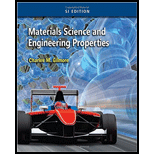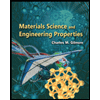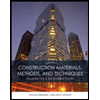
Materials Science and Engineering Properties, SI Edition
1st Edition
ISBN: 9781305178175
Author: GILMORE, Charles
Publisher: Cengage Learning
expand_more
expand_more
format_list_bulleted
Concept explainers
Question
Chapter 2, Problem 31CQ
To determine
The atoms by which mer of the polyethylene is made up of.
Expert Solution & Answer
Want to see the full answer?
Check out a sample textbook solution
Students have asked these similar questions
1,5 m
1,5 m
A
1,6 KN
F
0,8 m
E
0,8 m
5.85 The flow pattern through the pipe contraction is as shown, and the Q of water is 60 cfs. For d = 2 ft and D = 6 ft, what is the pressure at point B if the pressure at point C is 3200 psf?
D
E
Problem 5.85
20°
B
Please solve problem 8.13 (the highlighted question).
Chapter 2 Solutions
Materials Science and Engineering Properties, SI Edition
Ch. 2 - Prob. 1CQCh. 2 - Prob. 2CQCh. 2 - Prob. 3CQCh. 2 - Prob. 4CQCh. 2 - Prob. 5CQCh. 2 - Prob. 6CQCh. 2 - Prob. 7CQCh. 2 - Prob. 8CQCh. 2 - Prob. 9CQCh. 2 - Prob. 10CQ
Ch. 2 - Prob. 11CQCh. 2 - Prob. 12CQCh. 2 - Prob. 13CQCh. 2 - Prob. 14CQCh. 2 - Prob. 15CQCh. 2 - Prob. 16CQCh. 2 - Prob. 17CQCh. 2 - Prob. 18CQCh. 2 - Prob. 19CQCh. 2 - Prob. 20CQCh. 2 - Prob. 21CQCh. 2 - Prob. 22CQCh. 2 - Prob. 23CQCh. 2 - Prob. 24CQCh. 2 - Prob. 25CQCh. 2 - Prob. 26CQCh. 2 - Prob. 27CQCh. 2 - Prob. 28CQCh. 2 - Prob. 29CQCh. 2 - Prob. 30CQCh. 2 - Prob. 31CQCh. 2 - Prob. 32CQCh. 2 - Prob. 33CQCh. 2 - Prob. 34CQCh. 2 - Prob. 35CQCh. 2 - Prob. 36CQCh. 2 - Prob. 37CQCh. 2 - Prob. 38CQCh. 2 - Prob. 39CQCh. 2 - Prob. 40CQCh. 2 - Prob. 41CQCh. 2 - Prob. 42CQCh. 2 - Prob. 43CQCh. 2 - Prob. 44CQCh. 2 - Prob. 45CQCh. 2 - Prob. 46CQCh. 2 - Prob. 47CQCh. 2 - Prob. 48CQCh. 2 - Prob. 49CQCh. 2 - Prob. 50CQCh. 2 - Prob. 51CQCh. 2 - Prob. 52CQCh. 2 - Prob. 1ETSQCh. 2 - Prob. 2ETSQCh. 2 - Prob. 3ETSQCh. 2 - Prob. 4ETSQCh. 2 - Prob. 5ETSQCh. 2 - Prob. 6ETSQCh. 2 - Prob. 7ETSQCh. 2 - Prob. 8ETSQCh. 2 - Prob. 9ETSQCh. 2 - Prob. 10ETSQCh. 2 - Prob. 11ETSQCh. 2 - Prob. 12ETSQCh. 2 - Prob. 13ETSQCh. 2 - Prob. 1DRQCh. 2 - Prob. 2DRQCh. 2 - Prob. 3DRQCh. 2 - Prob. 4DRQCh. 2 - Prob. 5DRQCh. 2 - Prob. 2.1PCh. 2 - Prob. 2.2PCh. 2 - Prob. 2.3PCh. 2 - Prob. 2.4PCh. 2 - Prob. 2.5PCh. 2 - Prob. 2.6PCh. 2 - Prob. 2.7PCh. 2 - Prob. 2.8PCh. 2 - Prob. 2.9PCh. 2 - Prob. 2.10PCh. 2 - Prob. 2.11PCh. 2 - Prob. 2.12PCh. 2 - Prob. 2.13PCh. 2 - Prob. 2.14PCh. 2 - Prob. 2.15PCh. 2 - Prob. 2.16PCh. 2 - Prob. 2.17PCh. 2 - Prob. 2.18PCh. 2 - Prob. 2.19PCh. 2 - Prob. 2.20PCh. 2 - Prob. 2.21PCh. 2 - Prob. 2.22PCh. 2 - Prob. 2.23PCh. 2 - Prob. 2.24PCh. 2 - Prob. 2.25PCh. 2 - Prob. 2.26P
Knowledge Booster
Learn more about
Need a deep-dive on the concept behind this application? Look no further. Learn more about this topic, civil-engineering and related others by exploring similar questions and additional content below.Similar questions
- The following figure shows a vertical retaining wall with a granular backfill: 100.0 50.0 40.0 30.0 20.0 10.0- 5.0- 4.0 3.0- 2.0- = +1 0.8 0.6 0.4 0.2 0.0 -0.2 -0.4 -0.6 -0.8 -0.9 1.0- 0 10 20 30 40 45 ' (deg) (a) Figure Caquot and Kerisel's solution for K 3 Let H = 4m, a = 17.5°, y = 17.5 kN/m³, ' = 35°, and 8' = 10°. For given values of ' and 8', R' = 0.53. Based on Caquot and Kerisel's solution, what would be the passive force per meter length of the wall? (Enter your answer to two significant figures.) Pp= kN/marrow_forwardThe dam presented below is 180 m long (in the direction perpendicular to the plane of thecross-section). For the water elevations given on the drawing:a) Construct the flow net (minimum number of equipotential lines should be 10),b) Calculate the rate of seepage for the entire dam,c) Find the total uplift force on the dam (ignore barriers), andd) Estimate the hydraulic gradient at points A, B, and Darrow_forwardThe influence line for moment at B for the beam shown is A -6 m- B a. O at A, 6 at B, and 15 at C b. 1 at A, 1 at B, and 1 at C c. O at A, 0 at B, and -9 at C d. O at A, 1 at B, and 1 and C -9 m-arrow_forward
- Consider the following figure: H/3 Pa Given: H = 7 m, y = 13 kN/m³, ø′ = 25°, c′ = 12 kN/m², and a = 10°. For given values, K₁ = 0.296. Calculate the Rankine active force per unit length of the wall after the occurrence of the tensile crack. (Enter your answer to three significant figures.) Pa = kN/marrow_forwardWall movement to left 45+ '/2 45 + 6'/2 Rotation of wall about this point A vertical retaining wall shown in the figure above is 7 m high with a horizontal backfill. For the backfill, assume that y = 14.5 kN/m³, ' = 26°, and c′ = 18 kN/m². Determine the Rankine active force per unit length of the wall after the occurrence of the tensile crack. (Enter your answer to three significant figures.) Pa = kN/marrow_forwardConsider the following figure: 0.6 "d 0.5 k₁ = 0 0.4 03 =0 kh = 0.2 0.3 0.025 0.2 0.05 0.1 0.1 0.2 0 -0.1 ↓ 0 5 10 15 20 25 30 35 40 45 ' (deg) For a retaining wall with a vertical back and horizontal backfill with a c'-' soil, the following are given: H = 10 ft Y = 111 lb/ft³ ' = 25° kh = 0.2 k₁ = 0 c = 113 lb/ft² Determine the magnitude of active force Pae on the wall. (Enter your answer to two significant figures.) Pae = lb/ftarrow_forward
- A 13.0 ft high vertical wall retains an overconsolidated soil where OCR = 1.5, c' = 0, and ' magnitude and the location of the horizontal load on the wall, assuming the at-rest condition. Use Ysat (Enter your answers to three significant figures.) 33°. If the entire soil behind the wall is submerged with the water level at the ground surface, determine the 127 lb/ft³. Activity Frame P₁ = lb/ft Height above the bottom of the wall = O Icon Kov ftarrow_forward= A 5 m high smooth vertical wall retains a clay backfill with c = 13 kN/m², ' -25°, and y = 17.0 kN/m³. The clay is in active state. a. Determine the maximum tensile stress within the clay. (Enter your answer to three significant figures.) σα = kN/m² b. Determine the depth of the tensile cracks. (Enter your answer to three significant figures.) Zo = m c. Determine the magnitude and location of the active thrust, neglecting the tensile zone. (Enter your answers to three significant figures.) Pa x = = kN/m² marrow_forwardA composite beam is fabricated by bolting two 3.1-in.-wide by 14-in.-deep timber planks to the sides of a 0.4-in. by 14-in. steel plate. The moduli of elasticity of the timber and the steel are 1940 ksi and 30300 ksi, respectively. The simply supported beam spans a distance of 21 ft and carries two concentrated loads P, which are applied as shown. Assume LAB = LCD = 5 ft, Lgc = 11 ft, b = 3.1 in., d = 14 in. and t = 0.4 in. (a) Determine the maximum bending stresses σ,, σ, produced in the timber planks and the steel plate if P = 2.1 kips. (b) Assume that the allowable bending stresses of the timber and the steel are 830 psi and 24900 psi, respectively. Determine the largest acceptable magnitude for concentrated loads P. (You may neglect the weight of the beam in your calculations.) LAB B Answers: LCD LBC b Cross section D ksi, σ, = i ksi. (a) σ, = (b) P= i i kips.arrow_forward
- The internal shear force at a certain section of a steel beam is V = 107 kips. If the beam has the cross section shown, determine the shear stress at point H, which is located 2 in. below the top surface of the flanged shape. The centroid is 5.283 in. above the bottom surface of the beam, and the moment of inertia about the z axis is 465.8 in.4. 5 in. 2 in. H 业 1 in. 1 in. 12 in. 8 in. 1 in. 11.51 ksi O 9.72 ksi 8.34 ksi 6.03 ksi ○ 7.73 ksiarrow_forwardThe beam shown will be constructed from a standard steel W-shape using an allowable bending stress of 33.6 ksi. Assume P = 70 kips. L₁ = 2.2 ft, and L2 = 6.6 ft. (a) Determine the minimum section modulus required for this beam. (b) From the table below, select the lightest W shape that can be used for this beam. (c) What is the total weight of the steel beam itself (ie, not including the loads that are carried by the beam)? Lu B D L2 L₁ Wide-Flange Sections or W Shapes-U.S. Customary Units x x be Web Area Depth thickness Flange width Flange thickness Designation A d Tw by 4 S₁ و" in.² in. in. in. in. in,4 in.³ in. in.4 in,³ in. W24 x 94 27.7 24.3 0.515 9.07 0.875 2700 222 9.87 109 24.0 1.98 24 x 76 22.4 23.9 0.440 8.99 0.680 2100 176 9.69 82.5 18.4 1.92 24 x 68 20.1 23.7 0.415 8.97 0.585 1830 154 9.55 70.4 15.7 1.87 24 x 55 16.2 23.6 0.395 7.01 0.505 1350 114 9.11 29.1 8.30 1.34 W21 x 68 20.0 21.1 0.430 8.27 0.685 1480 140 8.60 64.7 15.7 1.80 21 x 62 18.3 21.0 0.400 8.24 0.615 1330 127…arrow_forwardA composite beam is made of two brass [E=114 GPa] bars bonded to two aluminum [E = 74 GPa] bars, as shown. The beam is subjected to a bending moment of 335 N-m acting about the z axis. Using a = 5 mm, b = 30 mm, c = 10 mm, and d = 20 mm, calculate (a) the maximum bending stress in the aluminum bars. (b) the maximum bending stress in the brass bars. N Aluminum C Brass Brass Aluminum b Answers: (a) σal= (b) Obr= a a MPa MPaarrow_forward
arrow_back_ios
SEE MORE QUESTIONS
arrow_forward_ios
Recommended textbooks for you
 Materials Science And Engineering PropertiesCivil EngineeringISBN:9781111988609Author:Charles GilmorePublisher:Cengage Learning
Materials Science And Engineering PropertiesCivil EngineeringISBN:9781111988609Author:Charles GilmorePublisher:Cengage Learning Construction Materials, Methods and Techniques (M...Civil EngineeringISBN:9781305086272Author:William P. Spence, Eva KultermannPublisher:Cengage Learning
Construction Materials, Methods and Techniques (M...Civil EngineeringISBN:9781305086272Author:William P. Spence, Eva KultermannPublisher:Cengage Learning

Materials Science And Engineering Properties
Civil Engineering
ISBN:9781111988609
Author:Charles Gilmore
Publisher:Cengage Learning

Construction Materials, Methods and Techniques (M...
Civil Engineering
ISBN:9781305086272
Author:William P. Spence, Eva Kultermann
Publisher:Cengage Learning